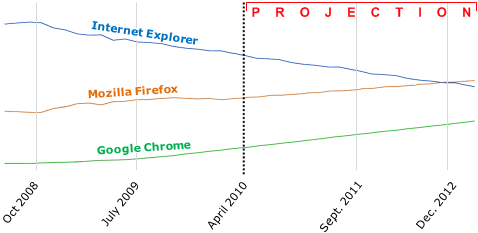Internet Explorer market share at all time low: Time to give up?

 Internet Explorer's market share has reached an all time low, falling below 60% in April with Firefox and Chrome steadily increasing their share.
Internet Explorer's market share has reached an all time low, falling below 60% in April with Firefox and Chrome steadily increasing their share.
According to Conceivably Tech, Internet Explorer users have declined since August 2009 by nearly 10%, while Firefox users have slightly increased by 5% or so, with Chrome taking a leap and increasing to a near 10% market share.
StatCounter sees it slightly differently showing a more clear decline in Internet Explorer users with Chrome clearly catching up. Though Ars Technica argue that Firefox may never reach the 25% mark, I'm quietly confident that Chrome in particular could tip the balance in time to come, with Firefox having the potential to take the lead.
With a bit of maths and a PhotoShopping frenzy, using StatCounter statistics and considering the current trends alone, this is how I see the market share going.

Of course, the world isn't as simple as that and Firefox may or may not overtake Internet Explorer in the long run. We can only hope, really.
- Read more: Those who know use Chrome
- Read more: Why is Google's Chrome getting so much attention?
But Internet Explorer is old and sluggish. It occasionally pees on the rug, and you have to take it for a check-up every few months - and it always ends up costing you dearly. It's a bit like an old dog which you have, and you care about, and will sincerely miss it when its gone, but it's starting to become a bit of a burden.
For the home user, there are two sides to consider:
- Simple users who don't particularly care about their choice of browser, and are happy to use what they recognise as "access to the Internet" through the trademark blue-'e' on the deskop. The EU enforced browser screen may increase awareness of other browsers, but those in the US will not think any different.
- Advanced users who do care about their browser, and are shifting away from Internet Explorer for their own personal reasons.
And as I have said before, for university environments, it's far simpler to keep Internet Explorer as default, with access to other browsers as well. But even today, I still cannot pinpoint a particular, specific reason as to why it still holds so much sway in the corporate environment.
With my shift from Firefox alone to multiple browsers for various reasons and productivity aspects, I rarely use Internet Explorer anymore. I have simply had enough of it. But seeing as patterns change and attitudes shift, I can bet my bottom dollar that I'll end up using it again in the long run.
Because let's face it, it's an old dog and there's no new tricks, but it would hurt too much to pull the plug for good.